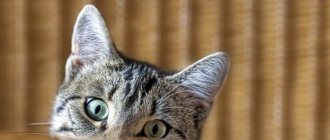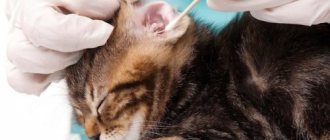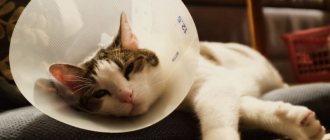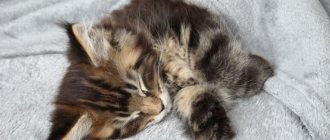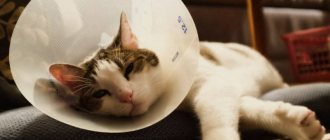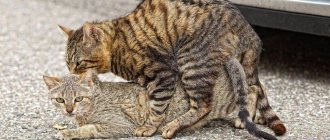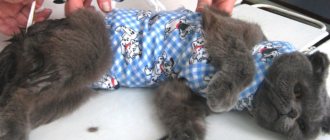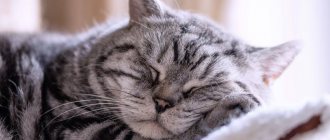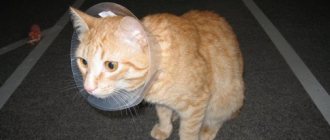A big plus for owners of domestic cats and the pets themselves will be that before castration, its owners will become familiar with the possible complications and diseases of neutered animals, their prevention and symptoms.
Often, an animal’s genitourinary system may suffer after castration. This is due to the fact that as the animal ages, sand accumulates in its kidneys, provoking the development of urolithiasis, cystitis of the bladder, and the development of obesity.
Urolithiasis (urolithiasis)
With this disease, it is necessary to understand that not providing timely assistance to the animal can lead to its death! Urolithiasis (urolithiasis) is considered a chronic disease in which the formation of salt deposits occurs in the kidneys, urinary ducts, and bladder.
Unpleasant sensations and pain are caused in the animal by stones formed from sand. This is a dangerous phenomenon, since, moving with the flow of urine, stones can clog the urinary ducts, which will lead to stagnation of urine and poisoning of the animal’s body. And untimely provision of assistance leads to the death of the pet.
Factors in the development of the disease
Pet owners need to know what can lead to the development of urolithiasis in their pet after the castration procedure. And also, the main symptoms and possible complications. Among the variety of factors that provoke the disease, we highlight the following:
- improper nutrition of the animal. Urolithiasis develops in the presence of fatty foods, fish, and feed of low and questionable quality. Increased content of proteins and minerals in the diet;
- mixed nutrition. This happens when the diet alternates between feed mixtures and natural food. Such a diet can lead to metabolic disorders and the development of urinary tract diseases;
- pet's sedentary lifestyle;
- insufficient water intake;
- drinking water with a high content of salts and minerals;
- hereditary predisposition;
- congenital pathological diseases in the genitourinary system;
- infectious diseases (streptococci, staphylococci);
- diseases and disorders of the digestive system.
Symptoms of urolithiasis
Urolithiasis can be detected at the first, initial stage only through laboratory urine testing. Since the first symptoms are little noticeable. Most often this is a decrease in the animal’s appetite, discomfort when urinating, decreased activity, and lethargy.
Under no circumstances should illnesses be allowed to spread. Progressing further, a large number of stones are formed, which, moving along the urinary ducts, can clog them completely or partially. At this stage, urolithiasis in cats is accompanied by certain symptoms:
- on palpation, the abdomen is tight and hard, the presence of painful sensations when pressed;
- the animal meows loudly, caresses, and behaves intrusively. Tries to attract attention;
- frequently visits the toilet, but does not have bowel movements;
- when urinating, meows loudly, which indicates acute pain;
- tries to go to the toilet in the wrong place, which was not typical for him;
- urine with blood. This is a symptom of hematuria. Stones moving along the ducts injure them and blood from the wounds enters the urine.
Reaction to sedatives and other factors
The reasons for what happened can be very diverse, but the most common is an inadequate reaction of the cat’s body to general anesthesia.
This is a very sensitive topic, since it is difficult to predict the reaction to painkillers.
- It happens that a completely healthy (at least in appearance) cat, young and not suffering from allergic reactions, simply dies on the operating table. Of course, there is little comfort in this, but even among doctors such situations do not occur so rarely. Again, what happened is often the fault of a specialist who did not conduct a full medical examination of the pet at the stage of preparation for the operation. The result is that the cat died, and the specialist finds himself face to face with the angry owners.
- There are frequent cases of oversight on the part of the owners: it even happens that before the operation the cat “safely” ate a poisoned rat/mouse and died. Death in such situations can occur both from the direct effect of the poison on the cat’s body, and from a reaction with sedatives. In such cases, anaphylactic shock is very typical: often a pathological reaction develops within a few seconds, and there is simply no time to help the cat.
- There are situations when a cat could not stand a starvation diet before castration: as soon as the anesthesia takes effect, the pet begins to vomit violently. If its airways are not cleared in a timely manner, the pet will die from suffocation. In addition, in such situations, it is possible that pieces of food and gastric juice enter the respiratory system, which subsequently leads to the development of aspiration pneumonia. This is also a very dangerous pathology that can be fatal.
Heart problems
Again, often the factors leading to death remain unclear, so there is always a risk. Many veterinarians assume that we can talk about undetected subclinical diseases of the heart and vascular system. Cardiac arrhythmia of various etiologies is extremely dangerous: it is extremely difficult to detect it in a cat (several ECGs and long-term observation are required).
Cats also have strokes and may have blood clots in the brain, blood vessels in the brain, or heart. In such cases, one can only guess about the real cause of death, since a full post-mortem examination is not the cheapest measure, and the owner of the deceased pet already has enough worries.
If a cat has any heart pathologies, then general anesthesia often causes serious complications. The result is postoperative pulmonary edema. It develops due to weakness of the left atrium.
If the operated pet begins to breathe heavily, and lumps of flaky foam fly out of its mouth, you should immediately take the animal to the doctor.
Is your pet sick? Feels bad?
Leave a request Or call us at:
8
Features of the treatment of Urolithiasis
If you suspect that your cat has urolithiasis, we recommend that you immediately contact your veterinarian. Only a competent specialist will be able to accurately determine the stage of the disease, identify the number, composition and size of stones. Set the level of complexity of the disease.
Important! If an animal has blocked canals, severe poisoning of the body, or obstruction of the urinary tract, then every minute will count!
The main factor in the treatment of urolithiasis for the animal owner should be the recommendations of a veterinarian. The fundamental ones are:
- pet's diet;
- quality and quantity of food intake;
- availability of clean drinking water in free access;
- If oxalate stones (with an insoluble structure) are detected, exclude foods rich in calcium, liver, sour vegetables from the diet, limit meat, fish, eggs.
Drug therapy for urolithiasis
Urolithiasis in neutered cats most often requires drug treatment. Only a veterinarian can prescribe medications necessary for an animal. Based on the test results of the animal, its condition. It is unacceptable to self-medicate urolithiasis in cats. May be assigned:
- Antibiotics. Used only in the presence of an infectious disease. Antibiotics from the group of cephalosporins are most often used.
- Uroseptics are used - 5-NOK, Furagin. Prescribed for the treatment of the genitourinary system.
- Regidron is used when the animal is severely dehydrated.
- Cantaren can be used for a diuretic effect.
- For pain, give No-shpa, Baralgin.
If the animal cannot relieve itself on its own, it is catheterized. Using a special tube through which urine and stones are removed. You may need to rinse your bladder to remove the stones. In the case of large stones, calcium deposits, or blockage of urine ducts, surgical intervention may be prescribed.
Obesity in castrated cats
The probability of accumulation of excess weight and obesity in neutered cats is very high. This can even be called a common phenomenon that brings discomfort to the animal. Excess weight accumulates due to a sedentary lifestyle, since castration makes cats sedentary and lethargic, but they continue to eat a lot and with pleasure.
A cat's excess weight is easily visible and noticeable. This is a layer of fat on the abdomen, poor palpation of the spine and ribs. Obesity in an animal can cause various diseases of internal organs, the cardiovascular system, and hormonal imbalance. Obesity also has a bad effect on bones and joints.
It is impossible to start this disease and not reverse its influence. It is better to start treating obesity in the early stages. An important role in the treatment of the disease lies in the physical activity of the cat. Pay more attention to the animal, play with it, give it more opportunity to run and jump, because cats love this very much.
Organize proper and balanced nutrition, take more care of your pet. Add lean meat, vegetables, and dairy products. Use food specially formulated for neutered cats.
How does castration affect a cat's behavior?
Castration is a procedure that helps eliminate the harmful effects of an animal’s sexual instincts, but nothing more! In theory, if the pet is completely healthy and has undergone the castration procedure, its character will only improve.
It is important to understand here that the period of change in hormonal levels depends on the age at which the cat was castrated. The optimal period for the procedure is considered to be from 7 to 9 months. At this age, the pet has already developed physically, but has not entered into a state of sexual hunting. You need to castrate your pet before he starts marking and calling the cat.
It is known that the speed of development of the reproductive system is individual; some cats are already actively looking for a partner at 6 months, while others do not think about mating until 1.5 years. The procedure can be performed after the testicles have descended into the scrotum. Normally, this occurs by 4 months of age or earlier. If a cat suffers from cryptorchidism (undescended testicles), castration is postponed until one year of age. The fact is that this feature can be eliminated naturally.
Note! Cryptorchid cats also actively mark territory, just like their “full-fledged” brothers. Cryptorchidism is a harmless and non-lethal disorder, but it is inherited. It is recommended to castrate Cryptorchid cats and not allow them to be bred.
What's happening to city cats? Having started to walk, the cat screams, marks the territory and diligently attracts males. For 3–4 days, the female observes how the cats fight and divide the territory. The battlefield is flooded with marks and smells fragrant. The strongest cat that survives the fights gets the right to mate. This is roughly the scenario your pet will have to go through if you let him outside.
Cystitis in cats
Cystitis is the most common disease in cats after the castration procedure. Absolutely different reasons can provoke cystitis in your pet. This includes poor nutrition, quality of water consumed, stress, hypothermia, weakened immunity, chronic diseases, and various infections.
The basis of treatment for cystitis is proper nutrition - the quality and quantity of food, the regimen of intake. It is necessary to strengthen the animal’s immunity and increase the body’s protective properties.
There are specially designed diets for this; you can learn about them from your veterinarian. The doctor will also prescribe the necessary medication and create a diet.
Prevention of cystitis
Every caring owner of a neutered cat who wants to provide their pet with a long and happy life should know and adhere to the basic rules of feeding their pet:
- do not overfeed the cat, the required feeding schedule is 3 times a day;
- do not treat the animal with food from your table, especially smoked, fried, fatty, soups, pasta...
- dry food should not be given constantly; there are specially designed medicinal foods;
- Only use meat that is not fatty; it is better to steam it. It could be chicken, turkey, beef;
- It’s good to add carbohydrates to your diet – buckwheat, oatmeal;
- Make sure your pet always has access to clean water.
Treatment of cystitis
A specialist should treat cystitis in a cat and prescribe medications. Trying to choose medications on your own can harm your pet and even worsen its condition. The veterinarian will prescribe various medications as necessary.
To eliminate the symptoms of the disease and alleviate the condition, use the drug Stop Cystitis. If the disease is mild, you can take Urotropin. If bacterial microflora is detected, antibiotics may be required. If there is an exacerbation of cystitis, Furacilin will be required.
Only a veterinarian can determine the degree of the disease, the required medications, dosages, and dosage schedule. The task of the owner of a sick animal is to comply with all the necessary instructions of the veterinarian.
Practice disease prevention based on the recommendations in our article. This will help protect your pet from obesity, cystitis and urolithiasis after castration. The health of the animal is always in your hands!
